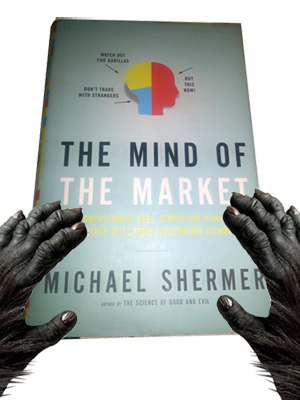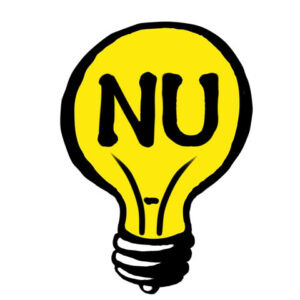 “Mind of the Market” by Michael Shermer is an entertaining exploration of how our evolutionary past has wired us to think about money. He attempts to explain our jump from hunter-gatherers to consumer-traders and the growth of the capitalist marketplace from the simple trading of favors between proto-human primates. Using discoveries from the new field of neuroeconomics he illuminates the biological and psychological roots of why, when it comes to cash, we all act irrationally.
“Mind of the Market” by Michael Shermer is an entertaining exploration of how our evolutionary past has wired us to think about money. He attempts to explain our jump from hunter-gatherers to consumer-traders and the growth of the capitalist marketplace from the simple trading of favors between proto-human primates. Using discoveries from the new field of neuroeconomics he illuminates the biological and psychological roots of why, when it comes to cash, we all act irrationally.
Although this book is not about wildlife preservation or conservation, it does offer insights as to why it is sometimes so difficult to implement real changes in pro-environmental behavior. The good news is that once these traits that hold us back from greater conservation efforts are understood, they can be worked around.
But I Want It NOW!
One feature of our shared primate past that can hinder conservation efforts is that we find it difficult to delay gratification. Organisms that ate, drank and consumed NOW survived.
Many environmentally sound actions require us to put off rewards or recognize purely intellectual ones. Take for example the long, drawn out battle to introduce energy saving compact fluorescent bulbs. We can easily calculate the future benefits of a lower total cost for lighting. But paying an extra $2 now so that we can save $45 in future energy costs is difficult for our inner monkey.
This trait has also hindered the adoption of solar panels to produce electricity to power our homes. The only way to get people (and the great apes) to prefer an option which requires them to wait a long time for the payoff is to give them an incentive. And from research it appears that the larger primates will only take a chance on future benefits if the incentive can be framed to appear at least two times as large as their initial investment.
Given that information, it’s no surprise that photoelectric panels took so long to become a common feature in southern California homes. They only became popular when companies started ‘leasing’ the solar equipment to spread the large initial costs of ownership over many years. Generous subsidies then lowered the adaptation risks further.
Fair Dealing and Familiarity Makes My Inner Ape Happy
We share an innate sense of fairness with other primates. Experiments with both chimps and capuchin monkeys have consistently shown that they understand the concept of equal pay for equal work. If one of two task partners receives a tasty treat as a reward for ‘working’ and does not share it, the other primate will do the equivalent of staging a strike by expressing anger at the injustice and refusing to cooperate in the future.
We also have a strong inherited bias towards the familiar, especially when the unfamiliar involves just a bit more work.
Put that sense of fairness with the desire for familiarity and you have an explanation for one of the more irrational periods in my life. I have to confess that when the city I lived in started to require that I sort different types of trash into separate bins my Paleolithic primate threw a fit. I flat out refused to sort my garbage for a couple of years.
Intellectually I understood the benefits of recycling to the environment and society as a whole. That wasn’t the point. I was being forced to disrupt my familiar routine and do extra work for which I was not being paid. And it didn’t help that one of the parties benefiting from my efforts was a large, very profitable national company. Were my actions illogical? Yes, but only when considered in the context of a modern consumerist society.
So what changed my mind about sorting my trash? Well, everyone around me was doing it. So after a while I started doing it too.
Monkey See, Nancy Do
As social primates we care about our reputation and status. We want and need to be trusted and recognized as part of a group. We take on the behavioral characteristics of our ‘tribe’. In fact we have special neurons called spindle cells that are specifically wired for ‘monkey see, monkey do’. These cells are only found in chimpanzees, bonobos, gorillas, orangutans and humans. Homo sapiens has the greatest number of spindle cells and they helped our distant ancestors mimic behaviors that were more effective at finding food and fitting in.
Recyling is becoming a hallmark of the consumerist tribe of southern California. Looking back, by not sorting my trash I started to feel that I was deliberately separating myself from people. And it made me uncomfortable.
Monkey Mind Manipulation
After reading Shermer’s book I realize that the way that the recycling program was presented to me was flawed. It might have been better if the mailing said that my neighborhood had been selected to take part in an experimental recycling program that will help the company control costs. However, if I decided that I didn’t want to take part, my waste disposal costs would be going up by $30 per month. I would have to call or mail the company to opt out of the program. That strategy appeals to a couple more quirks of our monkey minds; the desire to look good in front of our ‘tribe’ and our fear of losing what we have.
“The Mind of the Market” helped me shed light on my own actions and made me less cynical about others behavior. If people do irrational things that just don’t make economic or environmental sense they aren’t being deliberately obstinate. Maybe we just have to be more creative to convince their Paleolithic minds.
Created by: Nancy Ulrich.
